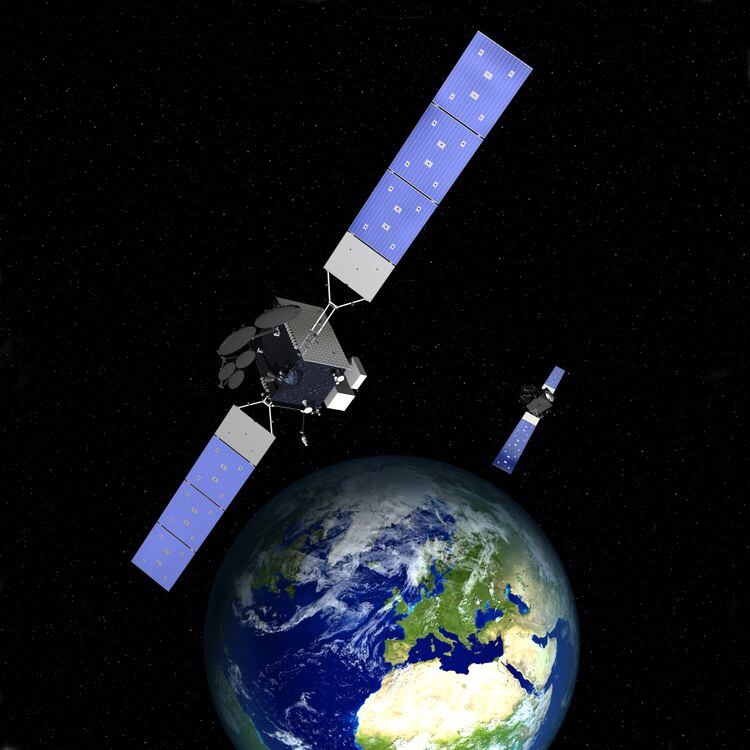LONDON — Britain has joined forces with the United States in a coalition aimed at bolstering space defenses against hostile actions by rivals such as China and Russia, according to Britain’s defense secretary.
In a second space-related tie-up, the two countries are partnering in a project to field a small-satellite demonstrator within a year, Penny Mordaunt told delegates at the Air and Space Power Conference in London on July 18.
Britain is the first international partner to formally sign up for what is a little-known, American-led coalition called Operation Olympic Defender aimed at strengthening allies’ abilities to deter hostile actions by rivals.
Mordaunt said over the next 18 months that Britain will send eight personnel to the U.S. Combined Space Operations Center in California to support the operation.
Britain will join the U.S. and other international partners in a coalition formed to “strengthen deterrence against hostile actors in space and reduce the spread of debris in orbit,” she said.
RELATED

Mordaunt told the audience of air force chiefs and others that rivals were already “doing all they can to disrupt access to services” like global communications, intelligence, surveillance and navigation.
The defense secretary laid out the scale of threats already posed in space.
“China has tested hit-to-kill interceptor missiles increasing deadly debris and threatening every sovereign space enterprise. Russia is conducting sophisticated on-orbit activities, developing missile interceptors to threaten satellites and electronic warfare systems to jam satellite signals. And nonstate actors and cyber hackers have the potential to scramble satellite data and manipulate Earth-observation data to their advantage,” she said.
“The U.K. must be ready to face these dangers and [the Ministry of] Defence must play its part … but we know we cannot compete in this contested and dangerous world alone,” she added.
With “partnership” the name of the game, further evidence of Anglo-U.S. cooperation in space also came through Mordaunt’s announcement of a trans-Atlantic team of British and American personnel formed under the banner of Team Artemis to launch a constellation and undertake research into the military potential of small satellites.
Industry is expected to be involved. More details of the program will likely be revealed at the Royal International Air Tattoo opening at Fairford air base, southwest England, on July 19.
Mordaunt said Britain will invest £30 million (U.S. $37 million) in Artemis. But Royal Air Force officers said the total amount of money available to the program would be significantly larger.
The two allies are fast-tracking the development and hope to launch the demonstrator within 12 months.
For the most part, Britain dominates the small-satellite market, with the Airbus-owned company Surrey Satellite Technology alone accounting for 40 percent of the market share worldwide.
Surrey Satellites developed the Carbonite 2 spacecraft to demonstrate the ability of small, low-orbit satellites to provide high-resolution, full-motion video and imagery in color.
Carbonite 2 was launched on board the Indian PSLV rocket. The Artemis spacecraft, however, is likely to be launched from a dedicated small-satellite launcher able to demonstrate speed of response required to deploy the spacecraft in low orbit.
The government didn’t directly address the issue of launch, but Mordaunt’s announcement that an RAF test pilot has been seconded to work on Virgin Orbit’s small-satellite launch program seems to indicate the direction of travel.
Virgin’s LauncherOne rocket was recently successfully launched from under the wing of a 747 aircraft over the Mojave desert, opening the way for the company to deploy commercial payloads.
The company is considering using an airfield in Newquay, western England, as a spaceport to operate the 747 launch service.
The head of the Royal Air Force, who is about to step down from the job, announced the service is reforming 23 Sqn as a space squadron responsible for day-to-day space command and control, including the flying of satellites and coordination with allies.
While Mordaunt lifted the lid on some space thinking this week, industry executives and others are still awaiting the release of the MoD’s defense space strategy, which has been repeatedly postponed. It’s the key document detailing how Britain intends to develop its approach to space in the decade ahead.
Although now heavily revised, it’s been awaiting publication for well over a year. The last plan to publish in May was scuttled by the sacking of then-Defence Secretary Gavin Williamson.
The latest from the MoD on publication came in the form of a written parliamentary answer last week: “Our strategic work on space has developed significantly and will play a key role in spending review decisions. We expect to publish later this year.”
Andrew Chuter is the United Kingdom correspondent for Defense News.







